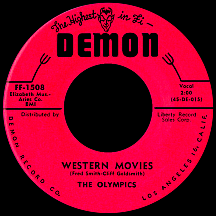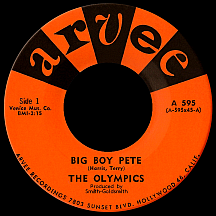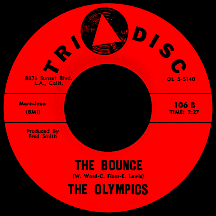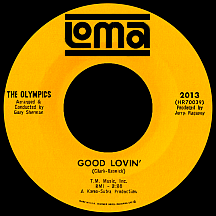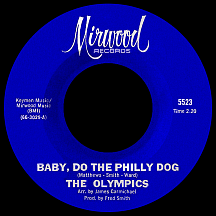THE OLYMPICS
A Los Angeles-based vocal group, The Challengers, secured a comfortable place in the extremely competitive music industry...after changing their name. As The Olympics, they quickly established a national presence, though it was short-lived. Considered a "one-hit wonder" in some parts of our great nation, they nevertheless enjoyed an eight-year run as relatively big fish in a big pond: the most populous corner of the U.S., Southern California. But there's more to this act with a sports-inspired name than just the humorous, infectious (and, alas, derivative) 1958 hit "Western Movies." In the long haul, Walter Ward's quartet (sometimes a quintet) were as big as any rhythm and blues act could hope to be, rivaling sales and airplay levels of eastern groups like The Drifters, Little Anthony and the Imperials and The Miracles as well as The Coasters, another SoCal outfit they were often compared to.
Their name wasn't so much based on the Ancient Greek Olympics or its modern-day equivalent as something more localized. The Olympic Auditorium has been called a Los Angeles landmark, where wrestling matches became habit-forming (for years, commentator Dick Lane hosted those entertainingly antagonistic conflicts each Wednesday night on KTLA-TV, channel 5) and boxing and even roller derby matches brought in huge crowds. Olympics just felt like an obvious name for an L.A.-bred music act. Lead singer Ward had actually been born in Jackson, Mississippi in 1940 and sang during childhood with his father and three uncles in a gospel group, The Ward Brothers. Later, he and cousin Eddie Lewis sang with another gospel group and Eddie also played trumpet, saxophone and piano for a high school band called the Coasters that featured future Platters femme fatale Zola Taylor (this was at least a year before The Robins hijacked the Coasters moniker for themselves and launched a string of hits produced by Jerry Leiber and Mike Stoller).
Walter and tenor Eddie started an R&B quartet during their time at Centennial High in Compton, California, with the addition of baritone Walter Hammond and tenor Charles Fizer, who'd often competed against them in local talent contests; Marcus Banks played piano for the group. In 1956 they made a record for Melatone, a small local label. "I Can Tell," a standard ballad credited to Walter Ward and the Challengers, was backed by a Latin-style number, "The Mambo Beat," credited to Charles Fizer and the Challengers; neither side was particularly distinctive. Banks left at some point and bass singer Melvin King joined; he and Fizer sometimes covered for each other as the act fluctuated between four and five members.
Hitmaking L.A. vocalist Jesse Belvin brought them to the attention of local songwriters Fred Smith and Cliff Goldsmith, who suggested they record "Western Movies," a clear-cut imitation of the Coasters' '57 mega-smash "Searchin'," its laundry list of cops and sleuths replaced by heroic TV cowboys (as opposed to wild west movie stars, as the title suggests). Wyatt Earp, Cheyenne, Maverick, Gunsmoke's Mr. Dillon, Broken Arrow's "Old" Cochise, Tales of Wells Fargo's Jim Hardie, Jim Bowie, Sugarfoot, Have Gun - Will Travel, Boots and Saddles, Jefferson Drum and Restless Gun, all shows and/or characters popular during the 1957-1958 TV season, provided enough of a diversion, it appears, for any woman to reject her man's advances. Released on Demon, a label distributed by Liberty Records (Jody Reynolds' "Endless Sleep" had just been a hit for the label), "Western Movies," with its timely lyrics and gunfire sound effects, went top 20 on KFWB in L.A., while nationally it reached the top ten in September.
Smith and Goldsmith's frantically-paced "(I Wanna) Dance With the Teacher" prudently avoided any sound effects, though the farcical scene described in the lyrics ('She slipped on a 'nana peel and hit the floor...the teacher took a hop, then she landed like a mop!') put it in the classroom novelty realm of the Coasters' "Charlie Brown" (which, two months afterwards, charted about six dozen positions higher than where the Olympics single stalled in January '59). Then ("The fellas all-a call me...') "Chicken," a crazy 'cock-a-doodle-doo' tune, humorously explored the outside-the-barnyard dating dilemma called shyness. A no-show at radio, it was the third and final Demon disc.
The most lucrative period came with another L.A. label, Arvee (owned by and named after Richard "R.V." Vaughn as a companion to his HiFi and Orbit imprints). Kickoff single "Private Eye" lifted Henry Mancini's "Peter Gunn" theme and utilized the "Searchin'"/"Western Movies" template, calling out the names of various TV and film gumshoes (and one lawyer): besides Gunn, there were the guys on 77 Sunset Strip, The Maltese Falcon's Sam Spade, Perry Mason, Richard Diamond, Ellery Queen, McGraw of Meet McGraw and the generic Johnny Law, plus references to the series The Lawless Years and Dragnet. The record charted in September 1959, but didn't stick around long.
That record's flip side, Smith and Goldsmith's "(Baby) Hully Gully," was the first hit song to celebrate a dance they claimed was '...spreadin' 'round like an awful disease,' and while "The Twist" (Hank Ballard's original) had been established about six months earlier, the hully gully dance craze of early '60 (which instructed participants to 'shake your shoulders' and 'wiggle your knees') predated the Chubby Checker-fueled twist phenom by several months. In L.A. it was the Olympics' biggest hit ever, making it to number two on KFWB's survey in March; on the national charts it stalled in the lower 30 despite being spotlighted on most of TV's top teen dance shows. The Olympics, down to a quartet by this time with Walter, Eddie, Charles and Melvin, scored another top ten on their home turf in the spring (that again peaked lower nationwide at number 50 on Billboard but much higher, number 20, on Cash Box and even better, top ten, on the R&B charts). "Big Boy Pete" was a remake of Don and Dewey's 1959 Specialty single that arguably improved on the original.
The next two singles reached much further back in music history. "I Wish I Could Shimmy Like My Sister Kate," composed by jazz greats A.J. Piron and Clarence Williams, was a hit in 1923 as an instrumental by three bands. Vocally, the Olympics called it "Shimmy Like Kate." 1844's "Buffalo Gals," penned by singer John Hodges, was rewritten a hundred years later as "Dance With a Dolly (With a Hole in Her Stocking)," adapted by the Olympics another 16 years after that as "Dance by the Light of the Moon." Both "Kate" and "Moon" fell a little shy of the Billboard top 40 while making it above the 40 mark in Cash Box. In Los Angeles, where the Olympics were kings, the records did much better. "Little Pedro" ('He's got to fight the bull...to win the governor's daughter!') represented a different approach around April '61; inspired, perhaps, by the Coasters' south-of-the-border adventures ("Down in Mexico"), the song even contains a yakety-style sax break. In attempting to stay on the dance tip, the quartet went down where they "Mash Them 'Taters'" and turned out a reimagined, bongo-augmented cover of Ballard's "Twist" in time to ride the coattails of Checker's second sprint to the top of the charts in early '62.
Confusion reigned in the Olympics' world that year when "Peanut Butter" hit the record stores on Arvee under a mysterious group name, The Marathons. The 'Open up your jar now...spread it on your cracker' ditty wasn't by the Olympics, as just one listen revealed, yet it was set to the tune of "(Baby) Hully Gully" and puzzlingly appeared on their Dance by the Light of the Moon album. Turns out members of The Jayhawks and that group's later incarnation, The Vibrations, were the guilty parties. Two other labels got tangled in a legal mess over the rights to what turned out to be a money-making top 20 hit; Chess had the act rerecord a similar version that was released on Chess and its Argo subsidiary, identified on both as Vibrations named by others as Marathons. Regardless, for years the Olympics were mistakenly credited with doing the song.
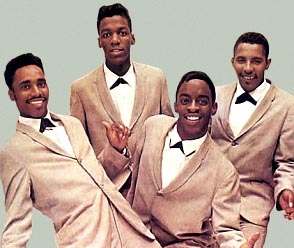
The Arvee contract ran its course and the Olympics recorded the next couple of years for Tri-Disc and its sister label Duo-Disc. "The Bounce" put them back in La La Land's top ten and Billboard's top 40 in spring 1963. "Dancin' Holiday," a less specific celebration of the gyrating lifestyle, cruised the charts mid-summer. Oddly, some desperate attempts were made at reviving their own hits (or imitating themselves, if you will). The back-to-back "Bounce Again" and "A New Dancin' Partner" started the dubious series. There were variations on other artists' dances (Slauson shuffle and watusi), two "Pete" sequels (one a new recording, the other a sneaky Arvee reissue of the original labeled "Big Boy Pete '65") and several that recycled the "Hully Gully" beat. Meanwhile, The Kingsmen got in on the act and penned new lyrics to the tune of "Big Boy Pete," resulting in a hit single/two minute commercial for "The Jolly Green Giant" that suggests the vegetable peddler might '...hit you with a can of beans.' It was a full-on top ten smash in February and March 1965.
Around that time, Walter and the guys moved to Loma Records (a Warner Bros. subsidiary specifically created to showcase soul music acts) and recorded one of their greatest tracks, "Good Lovin'." Written by Rudy Clark (best known for James Ray's hits), the song was first recorded for Mercury by Lemme B. Good (later leader of Limmie and Family Cookin') around March '65. Within weeks, a hot horn-backed Olympics version with partly rewritten lyrics by Artie Resnick hit the streets in L.A. and returned the quartet to their home-base top ten in May, though it didn't make much noise nationally. This left the door open for New York newcomers The Young Rascals to take a stab at it; despite a reluctance by many Southern California stations to play the more rocking remake, the rest of the country went wild over it and in April 1966 the Rascals had their first number one hit. Outside acts were encroaching on Olympics (and Don and Dewey and Lemme/Limmie) territory and cashing in!
Then again, members of the Olympics probably weren't too concerned about what the Kingsmen or Rascals were up to, as they were reeling from the death of longtime teammate and friend Charles Fizer. The Watts riots (too close to Compton for comfort) broke out in August 1965, turning the area into what some called a "war zone." Fizer was on his way to a group rehearsal when he was shot dead (from a stray bullet?); Melvin King's sister was also killed during the inner city conflict. Melvin, who'd previously left and rejoined, quit the group for good, which left Ward and Lewis to carry on as a trio with the addition of former Paragons lead singer Julius McMichael (who'd been going by the stage name Mack Starr for a few years). They next appeared on the Mirwood label with "Mine Exclusively," penned by Bobby Relf (of Bob and Earl, part of the Mirwood roster at the time) and Sherlie Matthews (a staff writer for the label), a barely-charting pop single that made the R&B top 30. "Baby, Do the Philly Dog," a Matthews-Fred Smith-Walter Ward tune, tied into another dance craze and reached the R&B top 20; it was also their last big hit in Los Angeles.
The group continued performing and made occasional records for about another decade. "Lookin' For a Love," a remake of the 1962 hit by Bobby Womack's Valentinos, could have put them back on the charts in 1968, but it was the last in a long line of Parkway Records releases, which probably had a negative effect on its chances. There were singles on Jubilee and Warner Bros. in 1969 and '70 and one final major label effort for MGM, "The Apartment," in 1973. The previous year, John Lennon's album Some Time in New York City included "Well (Baby Please Don't Go)," a live version (with wife Yoko's signature shrieks throughout) of the superb "Western Movies" B side "Well!" Walter Ward received full songwriting royalties, a nice bonus for the founder of the entertaining Olympics. With cousin Eddie Lewis, Walter continued fronting the performing act past the millennium mark.
NOTABLE SINGLES:
- I Can Tell - 1956
as Walter Ward and the Challengers - Western Movies /
Well! - 1958 - (I Wanna) Dance With the Teacher - 1958
- Chicken - 1959
- Private Eye - 1959 /
(Baby) Hully Gully - 1960 - Big Boy Pete - 1960
- Shimmy Like Kate /
Workin' Hard - 1960 - Dance by the Light of the Moon - 1960
- Little Pedro - 1961
- Dooley - 1961
- Mash Them 'Taters' - 1961
- Twist - 1962
- The Bounce - 1963
- Dancin' Holiday - 1963
- The Boogler - 1964
- I'm Comin' Home - 1965
- Good Lovin' - 1965
- Secret Agents - 1966
- Mine Exclusively - 1966
- Baby, Do the Philly Dog - 1966
- The Same Old Thing - 1966
- Lookin' For a Love - 1968
- The Things That Made Me Laugh (Now Make Me Cry) - 1969
- Girl, You're My Kind of People - 1970
- The Apartment - 1973


